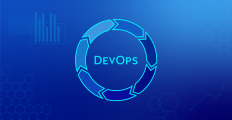DevOps was born out of a need to accelerate the development and deployment of software to closely follow consumer requirements. It is an evolution of agile development methods. It automates all phases of application creation and maintenance through to operation. It requires being able to create test environments on demand, being able to deploy, test and monitor applications on all its environments.
The missions of DevOps are multiple. In very general terms, his main tasks consist of setting up, managing and administering computer systems. The goal is for these systems to be adapted to the company and make it more agile.
The main missions of DevOps can be summarized as follows:
- Application deployment
- Realization of test phases, carried out upstream of development
- Implementation of production quality monitoring
The most important of these is the speed of execution. The pace of digital transformation and innovation is accelerating, allowing new products and services to be continually offered to consumers. Customers experience services with fewer glitches or bugs. Good coordination between the Dev and IT operations teams makes it possible to quickly detect or correct anomalies in the infrastructures. Thus, DevOps makes it possible to offer more services, without losing reliability.
Needs are constantly changing. Sometimes it is difficult to make the necessary changes. Owing to DevOps, the risks are reduced. Making changes is also easier because the development process is automated. The DevOps culture positively improves collaboration between teams.
Let’s see together why Devops is to be adopted and the solutions of the DevOps services approach for SaaS Startups.
- Introduce the DevOps culture and animate it
- Facilitate teamwork
- Have a solid and efficient infrastructure
- Guarantee continuity of service
- Maintain the reputation of the company
- Quick time to market of the product (Time To Market)
- Anticipate future growth
- Focus on core business
The DevOps approach for Startups: an approach to adopt
A Startup is such that it must operate with optimized resources, whether people, time, or financial means, the launch of the service and its hosting. Therefore, it becomes crucial to keep infrastructure costs low in such a difficult situation while improving business agility.
The product of the Startup, if it turns out to be minimal at the start, must represent the Startup’s innovation. Therefore, the company will have to improve its product, which leads to discussion and validation: this is where DevOps comes in.
Its role is essential because it participates in the following:
- Synchronize Tasks
- Integrate the Startup in the Cloud
- Anticipate growth
- Improve Time to Market
In an ideal and optimal approach, the DevOps for Startups approach and its methodology must be adopted from the first phase of its development because everything that will result from this will depend on the directions that DevOps will take. In addition, DevOps will bring in added value: the automation of processes and tasks, the notion of Dockerization, and the importance of a light, portable and profitable infrastructure.
The DevOps approach for Startups: what are the solutions?
In terms of innovation, the Cloud brings scalability, speed of processes, intelligence, and increased productivity to the company. The advantage for a startup creating its infrastructure in the Cloud is a growing capacity of resources, availability, and unparalleled flexibility.
The infrastructure must be robust. Collaboration with DevOps from the beginning of the creation of the Startup is the best practice to implement, be it by hiring in-house teams, which can prove expensive in the long run, or by outsourcing the project to a DevOps service provider.
On the other hand, the Cloud brings many new practices to an organization, such as delegating part of its activity to other teams. The idea is, of course, to set up your Cloud infrastructure by beginning from scratch with the processes and times to be implemented and to change Cloud provider as soon as the need arises, such as a change in a pricing policy, the technical transformation of the provider, degradation of quality, etc. As a result, the Startup acquires absolute independence (no longer dependent on the Cloud) and does not risk losing money concerning the cost of hosting, which may be well above the company’s needs.
Setting up and managing your infrastructure with full knowledge of the ins and outs of setting up a SaaS business means having all the critical tools. Startups must tend towards the concept of development, where the distribution of roles and the organization make it possible to achieve a continuous integration vision and develop “versioning” so that it fits at a Time To Market.
Improving the delivery process is upstream work. You must choose the right tools, define your needs and highlight the tool-need relationship. When we talk about startups, we have to talk about youth. Conceptualizing a business model and services are a part of the promising approaches and good practices for all new companies.
To summarize within each team, it is necessary:
- To define roles
- Have a common vision
- Who does what with whom and for whom
- Make everyone aware of the importance of the other
- Interest everyone in the tools put in place, even if they are not part of their job
High Availability
The DevOps for Startups approach will provide high-availability solutions. Having an international phone number for location-independent startups, for instance, ensures rapid response. Also, that the company has a good reputation is very important. High availability and fault tolerance are the guarantees of this image. Damage it by poor availability of your applications, and it is a turnover that collapses.
Many free tools in the Cloud provide the Startup with the means to implement solutions at lower costs today (Docker, PostgreSQL, NoSQL, Apache2, NGINX, XEN, Ansible, etc.).
We must remember the continuous supervision of the processes. We must maintain rapid reactivity in the event of a breakdown. Responding quickly to security breaches in your information systems is the job of supervision (identifying performance problems and taking the necessary measures).
Implementation of a solid infrastructure: microservices, resource optimization
The notion of microservices (Docker, node.js, etc.) provides agile, flexible, and scalable environments for applications. For a startup, the idea of microservices is essential: scalability, portability, and less.
Optimization of system resources
Another critical point is how to optimize tasks such as optimizing the system resources of its infrastructure. However, keep in mind the budget and pricing of a Cloud solution service. Fortunately, the DevOps partner will advise you to analyze, and best respond to Cloud offers on the market by targeting your actual needs. A good partner specializing in the Cloud and DevOps will be a considerable asset. You can try to assemble an in-house team, but know that hiring tech talents is one of the most challenging startup issues in the U.S., the U.K. and Canada today.
A good solution is to have partners who will manage your infrastructure and your Cloud. Collaborating with other specialized companies allows you to technically enrich yourself with their experiences because they bring an open mind and propel your Startup’s evolution with proven good practices. While a typical DevOps partner will have other clients, you will likely be assigned a point person for close coordination. Some providers even assign a dedicated helpdesk or phone line with outbound caller id.
What the Cloud brings you is continuous service. The DevOps side within the Cloud will improve the code of your applications through development, testing, pre-prod, and production processes. All these steps are easily manageable on a cloud solution. They allow optimal responsiveness and, therefore, faster time to market. In addition, they quickly integrate all the changes a developer puts in place.
Conclusion: What DevOps brings to Startups
The DevOps approach for Startups, and by extension for any company, is above all:
- Think about portability during the product construction phase
- Maintain dynamic states
- Distribute roles and connect them
- Implement fault-tolerant solutions and monitor performance issues.
- Have an agile operation of the hosting infrastructure
Do you have a DevOps or Cloud project that would benefit from tailor-made Devops support? Contact us, and our Experts will answer you.

























Leave a comment!